|
|
|
Sort Order |
|
|
|
Items / Page
|
|
|
|
|
|
|
| Srl | Item |
| 1 |
ID:
128211
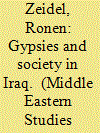

|
|
|
|
|
| Publication |
2014.
|
| Summary/Abstract |
This article focuses on a Gypsy group that lives in Iraq, away from the main concentrations in Europe. Although Gypsies apparently arrived in Mesopotamia around the tenth century, long before many Arab tribes and despite their cultural assimilation into the local culture, Gypsies were not assimilated into the local society, partly because the local society rejected them and partly because they did not want to assimilate. The difference in the attitude of the local society to the Gypsies lies in their perceived 'impurity' and their occupation, dancing and music, in which Gypsy women are employed. Iraqi Gypsies had long suffered from social as well as governmental discrimination: Iraqi citizenship was given to them only in 1979. Unexpectedly, it was the Iraqi dictatorship of Saddam Hussein which improved their status considerably, yet, at the same time, made them dependent on the regime. Consequently, after the fall of the Ba`th regime, Gypsies now face a bleak future. The article gives a concise historical presentation of Gypsy life in twentieth century Iraq and takes a closer look at literary views of the Gypsies, reflecting the limits of liberal attitudes toward them.
|
|
|
|
|
|
|
|
|
|
|
|
|
|
|
|
| 2 |
ID:
141860
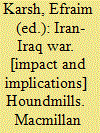

|
|
|
|
|
| Publication |
Houndmills, Macmillan Press Ltd, 1989.
|
| Description |
xiii, 303p.: figures, tablespbk
|
| Standard Number |
0333486862
|
|
|
|
|
|
|
|
|
|
|
|
Copies: C:1/I:0,R:0,Q:0
Circulation
| Accession# | Call# | Current Location | Status | Policy | Location |
| 031059 | 955.054/KAR 031059 | Main | On Shelf | General | |
|
|
|
|
| 3 |
ID:
031345
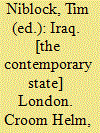

|
|
|
|
|
| Publication |
London, Croom Helm, 1982.
|
| Description |
283p.: tables, figureshbk
|
| Standard Number |
0709918100
|
|
|
|
|
|
|
|
|
|
|
|
Copies: C:1/I:0,R:0,Q:0
Circulation
| Accession# | Call# | Current Location | Status | Policy | Location |
| 020859 | 956.7043/NIB 020859 | Main | On Shelf | General | |
|
|
|
|
| 4 |
ID:
128208
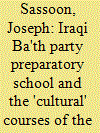

|
|
|
|
|
| Publication |
2014.
|
| Summary/Abstract |
Political indoctrination of the Ba'th party cadre in Iraq was critical for the durability of the regime for 35 years. The party preparatory school was the vehicle for the ideological training of the party elite, while special courses, provided by the party branches, focused on the 'cultural' education of the party's lower echelons to prepare them for becoming active members. Using the Ba'th's own archives, the article examines how the party's school, the branches' cultural courses, and the Ba'th cultural activities, combined to create an ideologically educated cadre which paved the way for the party's domination of Iraq's culture and ideology.
|
|
|
|
|
|
|
|
|
|
|
|
|
|
|
|
| 5 |
ID:
110303
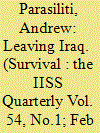

|
|
|
|
|
| Publication |
2012.
|
| Summary/Abstract |
On 19 December 2011, one week after US President Barack Obama welcomed Iraqi Prime Minister Nuri al-Maliki to the White House, and as the final US troops were leaving Iraq, an Iraqi judicial panel issued an arrest warrant for Vice President Tariq al-Hashemi, a Sunni from the rival Iraqi National Movement (also known as 'al-Iraqiyya'), for running a death squad. The warrant provoked yet another crisis in Iraqi politics, and was followed by yet another wave of terrorist bombings that killed and wounded scores.
American expectations about Iraq have been misplaced since the United States decided to invade and topple Saddam Hussein. Iraq was never a threat to the United States, and was not, and is not likely to be, a model for democracy in the Middle East, at least not any time soon. The post-war period in Iraq, and in US-Iraq relations, will instead be marked by uncertainty about Iraq's future and role in the region. Iraq remains a fragile, potentially failing state, where ethnic and sectarian politics still carry the day and external powers all too easily meddle. There is a deep-seated and fundamental lack of consensus about governance among Iraq's leaders. The federal, decentralised state model, enshrined in the Iraqi constitution, is openly contested.
|
|
|
|
|
|
|
|
|
|
|
|
|
|
|
|
|
|
|
|
|